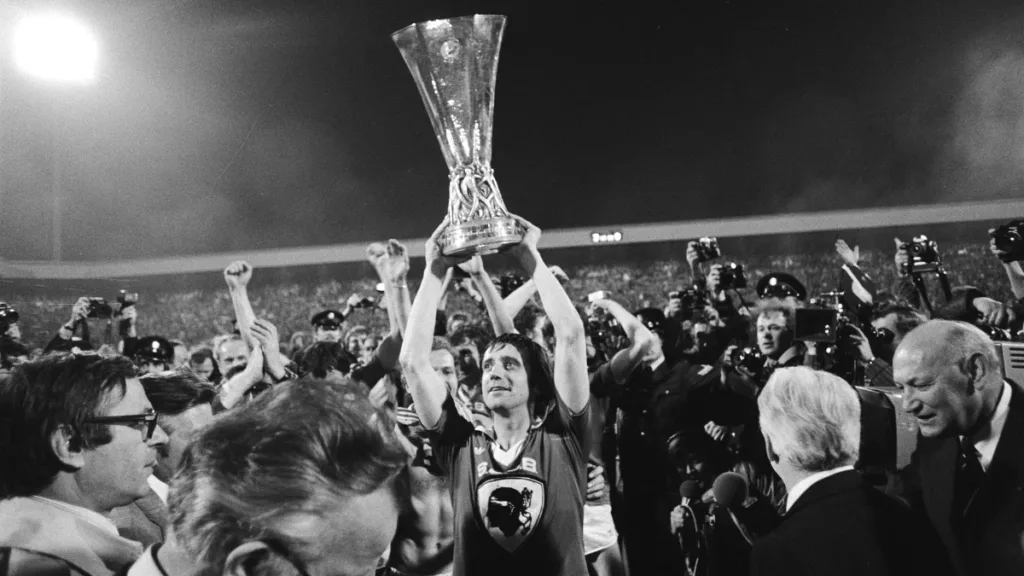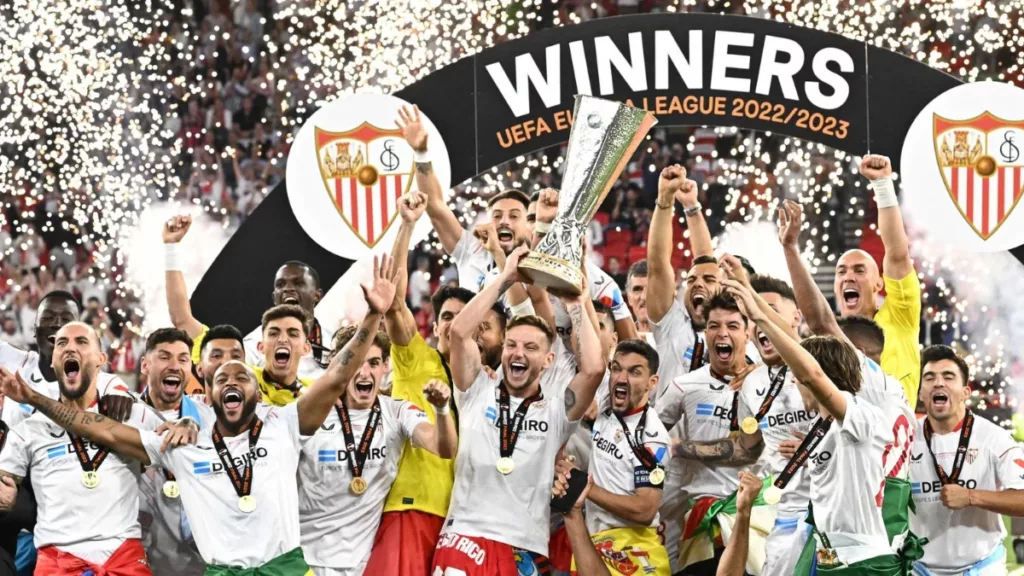One of the most sought-after prizes in European football is the Europa League. Let’s examine the teams that have achieved the greatest success in previous tournament editions.
Unveiling the Essence of the UEFA Europa League
The UEFA Europa League is the second-tier continental competition in Europe, ranking higher than the Europa Conference League and lower than the UEFA Champions League. Teams from all around Europe fight to win the Europa League trophy in this competition.
With a rich history of memorable games and teams, the Europa League is one of the most well-known competitions in Europe. Let’s look at how it all started and why it’s so significant.
Tracing the Evolution of the UEFA Europa League

The Inter-Cities Fairs Cup was the original name of the competition that would eventually become known as the Europa League.
It was held from 1955 to 1971 and saw a growth in the number of participating teams from 11 to 64. Before changing to the UEFA Europa League in 2009, it was renamed as the more well-known UEFA Cup in 1971.
Prestige and Significance of the UEFA Europa League
Even if it’s not the best continental competition in Europe, the Europa League trophy is nonetheless highly sought after and deserves respect.
Numerous outstanding teams and athletes have participated in the competition and won awards. For many players, winning the Europa League would be a career-high achievement.
The Quest for UEFA Europa League Glory
Like other tournaments, the Europa League demands its winners to put in a full season of work, competing valiantly at every turn to win the title.
Navigating the Road to the UEFA Europa League Final
It may be an arduous journey to reach the Europa League final. Although it is less typical, teams that must compete in the early qualifying rounds may have to travel from the preliminary qualifying round to the final, covering a distance of over a year. There will be six, occasionally seven, stages in the journey for those who automatically advance to the group stage.
Based on their results from the previous season, 12 teams are automatically qualified for the Europa League group stage. These are the four fifth-placed teams from nations ranked one through four, the fourth-placed team from a nation ranked five, the six domestic cup winners from the top six ranked nations, and the winners of the Europa Conference League competition from the previous season.
There is a qualification process for the remaining 20 teams. The remaining ten teams are made up of the six losing teams from the “Champions League third qualifying round and play-off round for non-champions” and the four losers from the “Champions League play-off round for champions.” Ten of those teams qualified by winning their matches in the play-off round of qualification.
Navigating the Knockout Rounds
The Group Stage features 32 teams divided into eight groups of four, engaging in a round-robin tournament with home and away fixtures. Group winners advance directly to the round of 16, while runners-up enter a preliminary knockout round against third-place Champions League teams.
The round of 16 and subsequent quarter-finals adhere to a two-leg format, with extra time and penalties determining winners if scores remain level. The semi-finals, also two-legged, exclude the away goals rule. Instead, ties may proceed to extra time and penalties. Victors secure a coveted spot in the final showdown.
The Epic Confrontation: UEFA Europa League Final
One of the most important games on the European football schedule, the Europa League final matches the finest teams on the continent against one another and has produced some memorable games in the past.
Every year, before the tournament even begins, a “neutral” venue is chosen to host the final. It normally happens within the same week as the Champions League final, with Wednesday nights typically hosting the Europa League final.
The Aviva Stadium in Dublin, Republic of Ireland, will host the season’s championship game on May 22, 2024.
Noteworthy Europa League Winners

Impressive Achievements and Records
The UEFA Europa League boasts remarkable records and statistics, showcasing the tournament’s prestige and allure:
- Club Title Record: Sevilla holds the record for the most UEFA Europa League titles, securing the trophy seven times.
- Player Title Record: Jose Antonio Reyes holds the record for the most UEFA Europa League titles by a player, with five wins.
- Consistent Participation: Club Brugge holds the record for the most consecutive seasons in the UEFA Europa League, participating for 20 seasons.
- Goal-Scoring Feats: Aritz Aduriz holds the record for the most goals scored in a single UEFA Europa League match, netting five goals.
- Seasonal Prowess: Radamel Falcao holds the record for the most goals scored in a single UEFA Europa League season, with 17 goals.
- All-Time Leading Scorer: Henrik Larsson holds the record for the most goals scored in UEFA Europa League history, tallying 40 goals.
Iconic UEFA Europa League Finals
Throughout its history, the UEFA Europa League has witnessed unforgettable finals, showcasing the clash of European football giants:
- Chelsea’s Dominance: In 2019, Chelsea delivered a memorable performance against rivals Arsenal in Baku. Led by the farewell narrative of Eden Hazard and the stellar contributions of Olivier Giroud, Chelsea secured a resounding 4-1 victory, with Hazard netting twice and Giroud adding to the scoresheet.
- Porto’s Triumph: The 2003 final, contested when the tournament was known as the UEFA Cup, saw Porto emerge victorious over Celtic with a 3-2 win after extra time. This final, decided by the silver goal rule, marked the beginning of Jose Mourinho’s illustrious managerial career and featured a standout performance from Deco.
Europa League Winners: The Full List
Europa League winners by year (1971-1999):
| Season | Winners |
|---|---|
| 1971-1972 | Tottenham Hotspur |
| 1972-1973 | Liverpool FC |
| 1973-1974 | Feyenoord |
| 1974-1975 | Borussia Monchengladbach |
| 1975-1976 | Liverpool FC |
| 1976-1977 | Juventus |
| 1977-1978 | PSV Eindhoven |
| 1978-1979 | Borussia Monchengladbach |
| 1979-1980 | Eintracht Frankfurt |
| 1980-1981 | Ipswich Town |
| 1981-1982 | IFK Goteborg |
| 1982-1983 | Anderlecht |
| 1983-1984 | Tottenham Hotspur |
| 1984-1985 | Real Madrid |
| 1985-1986 | Real Madrid |
| 1986-1987 | IFK Goteborg |
| 1987-1988 | Bayer Leverkusen |
| 1988-1989 | Napoli |
| 1989-1990 | Juventus |
| 1990-1991 | Inter Milan |
| 1991-1992 | Ajax |
| 1992-1993 | Juventus |
| 1993-1994 | Inter Milan |
| 1994-1995 | Parma |
| 1995-1996 | Bayern Munich |
| 1996-1997 | Schalke 04 |
| 1997-1998 | Inter Milan |
| 1998-1999 | Parma |
Modern Era (2000-2023)
| Season | Winners |
|---|---|
| 1999-2000 | Galatasaray |
| 2000-2001 | Liverpool |
| 2001-2002 | Feyenoord |
| 2002-2003 | Porto |
| 2003-2004 | Valencia |
| 2004-2005 | CSKA Moscow |
| 2005-2006 | Sevilla |
| 2006-2007 | Sevilla |
| 2007-2008 | Zenit |
| 2008-2009 | Shaktar Donetsk |
| 2009-2010 | Atletico Madrid |
| 2010-2011 | Porto |
| 2011-2012 | Atletico Madrid |
| 2012-2013 | Chelsea |
| 2013-2014 | Sevilla |
| 2014-2015 | Sevilla |
| 2015-2016 | Sevilla |
| 2016-2017 | Manchester United |
| 2017-2018 | Atletico Madrid |
| 2018-2019 | Chelsea |
| 2019-2020 | Sevilla |
| 2020-2021 | Villareal |
| 2021-2022 | Eintracht Frankfurt |
| 2022-2023 | Sevilla |
ALSO READ:
- Samir Nasri annoyed by Emiliano Martinez’s antics after quarter-final win
- Aston Villa star Emiliano Martinez suspended from Europa Conference League semi-final first leg
- Why was Liverpool Eliminated From Europa League Quarter-Finals Despite Beating Atalanta 1-0?
- Why Didn’t Isak Hien Receive a Red Card in the Liverpool vs Atalanta Game?
- What’s the Romelu Lukaku Injury? Will He Play in Roma’s Next Match against Bologna?
